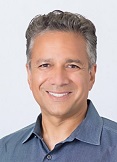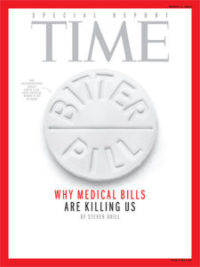|
BAY AREA ROUND TABLES
|
|
Choice in Aging Named a California Nonprofit of the Year
|
Choice in Aging (CiA) has been selected as a 2019 California Nonprofit of the Year by Assemblymember Tim Grayson. Debbie Toth, CEO of CiA, joined state senators and assembly members, along with other nonprofits, at a recent luncheon at the Capitol in Sacramento. And, CiA’s preschool, Choice in Learning, just won an award as the Best Montessori Preschool in Contra Costa County from Parents Press. (Debbie Toth)
|
|
|
|
HumanGood and Presby’s Inspired Life Announce Affiliation
|
HumanGood, California’s largest non-profit provider of senior housing and services, and Presby’s Inspired Life, a regional leader of continuing care and affordable housing for seniors in greater Philadelphia, are joining in an affiliation that will create the sixth-largest national non-profit senior living provider. Specifically, the affiliation will allow the united organization to enhance performance and care, create more opportunities for team members across a wider network of communities, and provide greater resources for additional continuing care, affordable housing communities, new products and services. (Tara McGuinness)
|
|
|
|
Kaiser Permanente to Build New Oakland Headquarters
|
Kaiser Permanente (KP) has announced plans to construct a new headquarters - The Kaiser Permanente Thrive Center - in Oakland. The 1.6 million-square-foot building will accommodate KP’s 7,000+ national and Northern California regional administrative employees, and should save $60+ million per year in operational costs from avoided maintenance on the old sites and lower utility expenses from the more energy-efficient new center. The new building is scheduled to break ground in 2020 and expected to be completed by 2023. It’s also estimated that this new building will generate a one-time $23-million economic benefit in addition to $15+ million annually in local tax revenues for Oakland. (Walt Meyers)
|
|
|
|
King & Spalding to Host Webinars on Women’s Health
|
On July 11, at 9:30 a.m. Pacific, King & Spalding (K&S) will present a webinar - Current Issues in Women’s Health, which will discuss how the increasing focus on women’s health issues will affect the drug and device industries. And, on July 23, at 10 a.m. Pacific, K&S will present a webinar - #MeToo Risks Facing Healthcare Providers - which will discuss these risks and how to minimize them. (Marcia Augsburger & Travis Jackson)
|
|
|
|
Mazzetti Participates in Award-Winning Packard Children’s Hospital
|
The ASHRAE Golden Gate Chapter has honored Lucile Packard Children’s Hospital Stanford with its 1st Place Technology Chapter Award for Healthcare Facilities. The award recognizes outstanding achievements by members who have successfully applied innovative building design in the areas of occupant comfort, indoor air quality, and energy conservation. As the MEP & Sustainability Engineer on the Packard Children’s project, Mazzetti worked early and closely with its design partners to achieve a precedent-setting sustainability profile, including LEED Platinum certification, creating the second children’s hospital ever, the fourth hospital in the country, and fifth in the world to earn this certification. Mazzetti and its design partners achieved the intersection of human health and environmental health. (Walt Vernon)
|
|
|
|
Wipfli to Present FQHC Bootcamp & Examines Earthquake Regulations
|
Steve Rousso will serve as MC for Wipfli’s Federally Qualified Health Center Preconference Bootcamp, on July 15, which is part of the 20th Annual Wipfli National Training Conference, running July 14-19, in Las Vegas. The FQHC workshop will include sessions on governance; financial overview; HRSA program management; components of a quality program; and overview of emergency preparedness programs and requirements. Meanwhile, Tony Taddey has published California Earthquake Regulations Impact Hospitals, in which he examines the challenges facing healthcare facilities in California in meeting seismic compliance regulations. "The costs are significant and will impact budgets, but it seems unlikely any hospitals will be forced to close in 2030 for non-compliance," Tony says. "Throughout the history of seismic regulations in California, legislators have shown their willingness to amend the laws to allow more time for hospitals to meet requirements and avoid a shutdown." He also points to moving services to compliant facilities and debt financing to help with meeting the requirements. (Jeff Johnson, Larry Blitz, Steve Rousso & Tony Taddey)
|
|
|
|
ZEISS Achieves Breakthroughs in Digital Tech & High-Resolution Imaging
|
ZEISS Medical Technology Segment recently announced several breakthroughs in digital technologies and high-resolution imaging: the ARTEVO 800, the first digital microscope in ophthalmic surgery; CLARUS 700, the first device that combines ultra-widefield UWF imaging, excellent image quality, and a full range of fundus imaging modalities, including fundus angiography; and the completion of two million Small Incision Lenticule Extraction (SMILE) treatments to date. (Angelo Rago)
|
|
|
|
SILICON VALLEY ROUND TABLE
|
|
Satellite Healthcare Assumes Operations of Salinas Valley Dialysis Program
|
Satellite Healthcare has taken over operations of the Salinas Valley Memorial Hospital Acute Dialysis program. Satellite is now running the PD, CRRT and Hemodialysis services within the hospital. The program consists of clinical staff, including RNs and CCHTs, as well as a Biomedical Operations team. (Rick Barnett)
|
|
|
|
VivaLNK’s Medical Sensor Platform Highlighted in Industry Journal
|
MedCity News recently published Silicon Valley startup VivaLNK wants to be the Amazon Cloud of remote patient monitoring, which describes VivaLNK’s range of sensor device products. "VivaLNK is currently developing a cardiac device, which is the centerpiece of a new platform with the capability to diagnose a-fibrillation more quickly and efficiently than traditional clinical standards," MedCity News reports. "The company has also made a software development kit available for the new device to allow third-parties to build in their own diagnostic and clinical decision support tools utilizing VivaLNK’s hardware in areas like stroke prevention and hypertension control. VivaLNK’s device has been submitted to regulators for marketing clearance and the first major market for its new offering will likely be Europe." (Jiang Li, Ph.D.)
|
|
|
|
LOS ANGELES ROUND TABLE
|
|
CareAcademy Partners with ClearCare to Provide Home Care Skills Training
|
CareAcademy, a leading mobile caregiver training platform recently announced a Preferred Partner and integration relationship with Clearcare, a web-based and mobile operating platform for home care agencies. The companies are now working together to integrate their core platforms to empower home care agencies to provide just-in-time learning about client needs and state-approved compliance training. A webinar about the integration is available to watch here. Also, two national homecare and healthcare providers, Touching Hearts at Home and Phoenix Home Care and Hospice, have recently endorsed CareAcademy for online caregiver training. (Helen Adeosun)
|
|
|
|
Nelson Hardiman Examines Healthcare Trends in Print & Podcast
|
The Daily Journal recently published The Shift from Obamacare to Trumpcare, an article by Harry Nelson of Nelson Hardiman, in which Harry explores the recent developments in the repeal of the individual mandate, Medicaid expansion, value-based care, and insurance coverage rules. Also, Harry was interviewed by Jay Ackerman, CEO of Health Data Vision, on the "Value-Based Healthcare Podcast," where they discussed new healthcare technologies and trends. Meanwhile, The Legal 500, a leading legal search directory, recommended Nelson Hardiman as one of the top healthcare law firms in the country, particularly noting the firm’s expertise in regulatory and FCA litigation. (Harry Nelson, JD)
|
|
|
|
ORANGE COUNTY ROUND TABLE
|
|
AgilisIT CEO Interviews Healthcare CEOs in Podcast Series
|
Joyce Tang, CEO of AgilisIT, has launched a podcast series, called Beating Goliath: The Blood, Sweat and Tears of Healthcare Startups, in which she interviews company founders and executives to find out how they are "punching above their weight and winning," plus insider tips from angel investors and venture capitalists. Recent episodes include interviews with Family Proud CEO Jaden Risner; WellBrain CEO Sumeet Maniar; P2B Investor Founder Krista Morgan; former VC and Founder of VAVICI Dr. Han Chiu; Purewick CEO Dr. Camille Newton; A Passion For Care CEO Patricia Melzer; and Elemeno Health founder Dr. Arup Roy-Burman. (Joyce Tang)
|
|
|
|
Alvaka Networks Offers Tips on Choosing an MSP & on Software Security Patching
|
In Finding an MSP to Protect Yourself from Outsourcing IT Risks, Alvaka Networks explains that managed service providers (MSPs) help fill the gaps, support strategic initiatives, and lighten the load an organization’s internal IT staff carries to make sure it protects customers from outsourcing IT risks. But due to recent high-profile attacks on local and global IT MSPs, company leaders may be concerned about the safety of working with an MSP. Alvaka provides a list of questions to ask both potential and existing MSP partners. Meanwhile, Alvaka will host a live and interactive webinar - Software Security Patching: Why you are struggling with this essential task!, on multiple dates in July and August. This webinar will take a deep dive into this complex security dilemma, what the risks are, and how you can start to solve this problem. (Oli Thordarson)
|
|
|
|
Cigna Ranked #1 for Supporting Healthy Communities & Families
|
Cigna ranked first in the healthcare industry, and second overall, on a new list of Top 100 U.S. Companies Supporting Healthy Communities and Families. The list, compiled by JUST Capital with support from Robert Wood Johnson Foundation, recognizes leading organizations that prioritize community health through supportive and sustainable business practices to improve the lives of employees, customers, and neighbors. Cigna is investing $200 million in the Cigna Foundation to improve community services, address childhood wellness issues, and help transform healthcare at societal and local levels. Meanwhile, results from Cigna's landmark U.S. Loneliness Index have been published in the American Journal of Health Promotion, as the company continues to advocate for a deeper understanding of the connectivity between physical health and emotional well-being. (Chris De Rosa )
|
|
|
|
PreludeDx Presents New Research in Luminal Stage 1 Breast Cancer Patients
|
Prelude Corporation (PreludeDx) recently announced its data from research on stage 1 breast cancer patients: Results of the study demonstrated that the company’s new test was able to stratify patients where those in the low-risk group had a 4% local 10-year risk of either invasive breast cancer or DCIS with surgery alone and 3% risk of local recurrence with surgery and radiation therapy. Patients in the elevated-risk group had a 15% local recurrence risk when treated with surgery alone but, after radiation therapy, had their local recurrence risk reduced to 3% at 10 years. (Dan Forche)
|
|
|
|
TECH MEMBERS' HEALTHCARE NEWS
|
|
Catasys Adds Canary Health to OnTrak Platform
|
Catasys, Inc., a leading AI and technology-enabled healthcare company, has formed a strategic partnership with digital therapeutics company Canary Health, in which Catasys is piloting Canary's Better Choices, Better Health program with eligible members of one of its national health plan partners. The program is a series of peer-moderated online workshops designed to improve an individual's self-efficacy in managing chronic conditions. It's been proven effective in major studies to improve health outcomes and lower healthcare utilization and costs. The partnership provides eligible OnTrak members with a path to specifically engage in self-managing their chronic disease. (Rick Anderson, West Los Angeles Technology)
|
|
|



 Swallowing Healthcare's Latest "Bitter Pill" - Transparency
Swallowing Healthcare's Latest "Bitter Pill" - Transparency